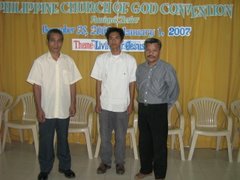Concerning Women in the Ministry
“Let your women keep silence in the churches: for it is not permitted unto them to speak; but they are commanded to be under obedience, as also saith the law. And if they will learn any thing, let them ask their husbands at home: for it is a shame for women to speak in the church.”—1 Cor. 14:34,35
Language could scarcely be more plain. It only remains for us to determine if the command of silence for these women at Corinth is intended for all women in all congregations.
A brief study of the original language will show us that the word translated as women can also be translated wives. We may also gain this understanding from the context of the writing. “They are commanded to be under obedience, as also saith the law.”
Reference is given here to Genesis 3:16, when God gives the place of the wife, saying that her husband would rule over her, or be her head. “…Let them ask their husbands at home…” This is sufficient proof that these words are directed to wives and not all women in general.
“How is it then, brethren? when ye come together, every one of you hath a psalm, hath a doctrine, hath a tongue, hath a revelation, hath an interpretation. Let all things be done unto edifying.”—1 Cor. 14:26
The burden of the chapter throughout is one of ensuring that the congregation of saints is edified upon their coming together. Thus is given the proper method for speaking in tongues (languages) and prophesying in verses 27-32. So strictly were these instructions to be followed that silence was commanded rather than to go outside of them. “But if there be no interpreter, let him keep silence in the church…(vs. 28). “For God is not the author of confusion, but of peace, as in all churches of the saints (vs.33).”
We infer from the reading that many of the wives at this location were not in obedience. They were speaking out in public assembly in a domineering way with neither regard for their husbands, nor for the edifying of the church. Their speaking was causing confusion and disorder in the congregation, thus their instruction was not to speak at all, not because they were women, but because they were out of order.
Again, this is consistent with the previous instruction given to a man who speaks in tongues. If he was unable to speak in a foreign language in such a manner that would be decent and orderly and in which all the church may be edified, then let him be silent. “But if there be no interpreter, let him keep silence in the church; and let him speak to himself, and to God (vs. 28).
In chapter 11, verses 4 and 5 of the same epistle, we are made aware that both men and women speak in the congregation of saints, for it says of both that they pray and prophesy. We will now allow the writer of the epistle to himself define what he meant by the word prophesy: “But he that prophesieth speaketh unto men to edification, and exhortation, and comfort.”—1 Cor. 14:3
According to chapter 11, women did speak in a public assembly of the church, for they, as well as the men, were permitted to prophesy. God granted women the privilege to speak unto men (mankind) that they would be built up in the things of God. Women were permitted to speak so as to provoke to love and good works. By their words, women in the congregation openly comforted the hearts of God’s children.Both men and women, under the direction of God, were able to bring forth the Word of God in such a manner as to convince and reveal God’s judgment to sinners and reveal the innermost secrets of their hearts. Women spoke as to cause the penitent sinner to fall down and worship God and acknowledge that He was behind every word they spoke, according to 1 Cor. 14:24, 25. This, according to Paul, is prophesying and this is done by women as well as men in Christian meetings. “But if all prophesy…” This “all” includes the women, for Paul writes, “Unto the church of God which is at Corinth, to them that are sanctified in Christ Jesus, called to be saints, with all that in every place call upon the name of Jesus Christ our Lord, both theirs and ours:”—1 Cor. 1:2
With the forgoing understanding, there is no possibility that the apostle Paul was demanding or imposing silence upon all women in the churches. In fact, in 1 Cor. 14, his burden is not men verses women, but rather order verses disorder.
The burden of his heart as he wrote this epistle is not only for the Corinthian church, but it directly applies in all the present day congregations of the church of God. Not for women only, but also for men. If any speaking will cause confusion and disorder, if no one is being built up in the Lord, and it is no more than a show in the flesh, then keep silent. “Be silent, O all flesh, before the Lord: for he is raised up out of his holy habitation.”—Zech. 2:13
1 Timothy 2:12
“But I suffer not a woman to teach, nor to usurp authority over the man, but to be in silence.”—1 Tim. 2:12
Many, however, still feel that it is a very unnatural thing to see a woman preaching. Their primary thought is that by so doing, she is out of her place and is usurping authority over the man. Again, Paul is addressing wives in the home setting, for he speaks of one man and not men in general. “I suffer not a woman to teach, nor to usurp authority over the man...” Again, the Greek word here translated man can also be translated husband. The very next verse strengthens his point when once again, as in 1 Corinthians 14, Paul refers to Genesis and is unquestionably dealing with the husband and wife relationship in the home life. “For Adam was first formed, then Eve. (1 Tim 2:13).”
The man (husband) is the head of the [woman, wife] home, not the head of the church. He, with the help of God, sets things in order in his own home. Christ is the head of the church, He being the Son of God, sets things in order in His own church. To usurp authority means to take the authority of someone else as your own and to act with that authority which was never intended to be yours. The woman is not to be forcing her opinions on her husband, for it is not her place to do so. This is the simple meaning of the apostle’s writing.
By the same principle, husbands (or men in general) are not to teach or give direction to Christ concerning matters of His church, for it is not their place. Men must keep silence concerning the gifts and the callings of God. God sets the members in the body as it pleases Him and not as it pleases men (I Cor. 12:18). A woman cannot be guilty of usurping authority over the man by delivering God’s Word if she is called [by God] to preach, for delivering God’s Word is not authority that belongs to man, therefore she did not take it from him. If a man were to forbid a God-called woman to preach, he would be guilty of usurping the authority of God.
The world continues to be plagued with the lifeless, formal traditions of men preachers who are no more than elected officials. In the spirit of bigotry they foam out their bias opinion and attempt to justify their position with a few scriptures clearly taken out of context. While they rant and rave that God would never call a woman to preach, they do not consider that God never called them to preach. Being therefore not of the number of Holy Ghost-called ministers, they can do naught else but proclaim error and advance the most deadly thing that has ever been, which is false religion. —S. Hargrave


















































































































